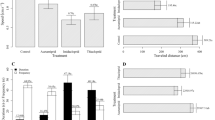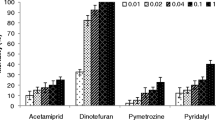Abstract
Africanized and wild bees are sensitive to synthetic insecticides, but may not be sensitive to botanical extracts. In this work, we evaluated the toxicity of botanical extracts with homemade preparations used in agroecological crops and their constituents on the bees Apis mellifera and Partamona helleri. Toxicity bioassays of adult bees were done by means of oral exposure and ingestion, using the insecticide imidacloprid as a positive control. Dietary consumption, respiration rate and bee flight were evaluated as sublethal parameters. Although some extracts were toxic to bees, survival was always higher compared to the results obtained with the imidacloprid, which was lethal to 100% of bees. In dietary consumption, P. helleri consumed less (5 mg/bee) in 3 h than A. mellifera (11 mg/bee), and P. helleri consumed less (7 mg/bee) in 24 h than A. mellifera (22 mg/bee). There was no difference in consumption of food containing plant extracts or food containing water only. We did not detect any adverse effects of the botanical extracts on bee respiration rates or flight. The major constituent of N. tabacum is nicotine (8.4–15.1%), in A. americana it is β-caryophyllene (11.3%), and in A. colubrina, lupeol (12.2%). Imidacloprid and nicotine were more toxic to bees (LC50 ≤ 1.3 and LC50 ≤ 44.3). Botanical extracts were selective to A. mellifera and the native bee P. helleri, and therefore, have the potential for ecofriendly pest control.




Similar content being viewed by others
References
Abbott WS (1925) A method of computing the effectiveness of an insecticide. J Econ Entomol 18:265–267. https://doi.org/10.1093/jee/18.2.265a
Arena M, Sgolastra F (2014) A meta-analysis comparing the sensitivity of bees to pesticides. Ecotoxicol 23:324–334. https://doi.org/10.1007/s10646-014-1190-1
Azwanida NN (2015) A Review on the extraction methods use in medicinal plants, principle, strength and limitation. Med Aroma Plants 4:196. https://doi.org/10.4172/2167-0412.1000196
Balbuena MS, Tison L, Hahn ML, Greggers U, Menzel R, Farina WM (2015) Effects of sublethal doses of glyphosate on honeybee navigation. J Exp Biol 218:2799–2805. https://doi.org/10.1242/jeb.117291
Barbosa WF, Smagghe G, Guedes RNC (2015a) Pesticides and reduced risk insecticides, native bees and pantropical stingless bees: pitfalls and perspectives. Pest Manag Sci 71:1049–1053. https://doi.org/10.1002/ps.4025
Barbosa WF, Tomé HV, Bernardes RC, Siqueira MA, Smagghe G, Guedes RN (2015b) Biopesticide-induced behavioral and morphological alterations in the stingless bee Melipona quadrifasciata. Environ Toxicol Chem 34:2149–2158. https://doi.org/10.1002/etc.3053
Blacquière T, Smagghe G, Van Gestel CAM, Mommaerts M (2012) Neonicotinoids in bees: a review on concentrations, side-effects and risk assessment. Ecotoxicology 21:973–992. https://doi.org/10.1007/s10646-012-0863-x
Brosi BJ, Briggs HM (2013) Single pollinator species losses reduce floral fidelity and plant reproductive function. Proc Natl Acad Sci USA 110:13044–13048. https://doi.org/10.1073/pnas.1307438110
Burden CM, Elmore C, Hladun KR, Trumble JT, Smith BH (2016) Acute exposure to selenium disrupts associative conditioning and long-term memory recall in honey bees (Apis mellifera). Ecotoxicol Environ Saf 127:71–79. https://doi.org/10.1016/j.ecoenv.2015.12.034
Campolo O, Cherif A, Ricupero M, Siscaro G, Grissa-Lebdi K, Russo A, Cucci LM, Pietro PD, Satriano C, Desneux N, Biondi A, Zappalà L, Palmeri V (2017) Citrus peel essential oil nanoformulations to control the tomato borer, Tuta absoluta: chemical properties and biological activity. Sci Rep 7:1–10. https://doi.org/10.1038/s41598-017-13413-0
Cárdenas-Ortega NC, González-Chávez MM, Figueroa-Brito R, Flores-Macías A, Romo-Asunción D, Martínez-González DE, Pérez-Moreno V, Ramos-López MA (2015) Composition of the essential oil of Salvia ballotiflora (Lamiaceae) and its insecticidal activity. Molecules 20:8048–8059. https://doi.org/10.3390/molecules20058048
Castillo L (2009) Screening of Uruguayan plants for deterrent activity against insects. Ind Crops Prod 29:235–240. https://doi.org/10.1016/j.indcrop.2008.05.004
Del Sarto MC, Oliveira EE, Guedes RNC, Campos LAO (2014) Differential insecticide susceptibility of the Neotropical stingless bee Melipona quadrifasciata and the honey bee (Apis mellifera). Apidologie 45:626–636. https://doi.org/10.1007/s13592-014-0281-6
Desneux N, Decourtye A, Delpuech JM (2007) The sublethal effects of pesticides on beneficial arthropods. Annu Rev Entomol 52:81–106. https://doi.org/10.1146/annurev.ento.52.110405.091440
Du Rand EE, Smit S, Beukes M, Apostolides Z, Pirk CWW, Nicolson SW (2015) Detoxification mechanisms of honey bees (Apis mellifera) resulting in tolerance of dietary nicotine. Sci Rep. 5:1–11. https://doi.org/10.1038/srep11779
Fairbrother A, Purdy J, Anderson T, Fell R (2014) Risks of neonicotinoid insecticides to honeybees. Environ Toxicol Chem 33:719–731. https://doi.org/10.1002/etc.2527
Fantke P, Gillespie BW, Juraske R, Jolliet O (2014) Estimating half-lives for pesticide dissipation from plants. Environ Sci Technol 48:8588–8602. https://doi.org/10.1021/es500434p
Feltham H, Park K, Goulson D (2014) Field realistic doses of pesticide imidacloprid reduce bumblebee pollen foraging efficiency. Ecotoxicology 23:317–323. https://doi.org/10.1007/s10646-014-1189-7
Gallai N, Salles JM, Settele J, Vaissiere B (2009) Economic valuation of the vulnerability of world agriculture con-fronted with pollinator decline. Ecol Econ 68:810–821. https://doi.org/10.1016/j.ecolecon.2008.06.014
Gianinni TC, Boff S, Cordeiro GD, Cartolano EA, Veiga AK, Imperatriz-Fonseca VL, Saraiva AM (2015) Crop pollinators in Brazil: a review of reported interactions. Apidologie 46:209–223. https://doi.org/10.1007/s13592-014-0316-z
Gontijo LM, Celestino D, Queiroz OS, Guedes RNC, Picanço MC (2015) Impacts of azadirachtin and chlorantraniliprole on the developmental stages of pirate bug predators (Hemiptera: Anthocoridae) of the tomato pinworm Tuta absoluta (Lepidoptera: Gelechiidae). Fla Entomol 98:59–64. https://doi.org/10.1653/024.098.0111
Gontijo PC, Picanço MC, Pereira EJG, Martins JC, Chediak M, Guedes RNC (2013) Spatial and temporal variation in the control failure likelihood of the tomato leaf miner (Tuta absoluta). Ann Appl Biol 162:50–59. https://doi.org/10.1111/aab.12000
Goulson D (2013) Review: An overview of the environmental risks posed by neonicotinoid insecticides. J Appl Ecol 50:977–987. https://doi.org/10.1111/1365-2664.12111
Han P, Niu CY, Biondi A, Desneux N (2012) Does transgenic Cry1Ac + CpTI cotton pollen affect hypopharyngeal gland development and midgut proteolytic enzyme activity in the honey bee Apis mellifera L. (Hymenoptera, Apidae)? Ecotoxicology 21:2214–2221. https://doi.org/10.1007/s10646-012-0976-2
Isman MB (2006) Botanical insecticides, deterrents, and repellents in modern agriculture and an increasingly regulated world. Annu Rev Entomol 51:45–66. https://doi.org/10.1146/annurev.ento.51.110104.151146
Johansen CA, Mayer DF, Eves JD, Kious CW (1983) Pesticides and bees. Eviron Entomol 12:1513–1518. https://doi.org/10.1093/ee/12.5.1513
Johnson RM (2015) Honey bee toxicology. Annu Rev Entomol 60:415–434. https://doi.org/10.1146/annurev-ento-011613-162005
Kessler SC, Tiedeken EJ, Simcock KL, Derveau S, Mitchell J, Softley S, Radcliffe A, Stout JC, Wright GA (2015) Bees prefer foods containing neonicotinoid pesticides. Nature 521:1–14. https://doi.org/10.1038/nature14414
Koskor E, Muljar R, Drenkhan K, Karise R, Bender A, Viik E, Luik A, Mänd M (2009) The chronic effect of the botanical insecticide Neem EC on the pollen forage of the bumble bee Bombus terrestris L. Agron Res 7:341–346. https://agronomy.emu.ee/vol07Spec1/p7sI31.pdf
Laycock I, Cotterell KC, O’Shea-Wheller TA, Cresswell JE (2014) Effects of the neonicotinoid pesticide thiamethoxam at field-realistic levels on microcolonies of Bombus terrestris worker bumble bees. Ecotoxicol Environ Saf 100:153–158. https://doi.org/10.1016/j.ecoenv.2013.10.027
Mansour R, Belzunces L, Suma P, Zappalà L, Mazzeo G, Grissa-Lebdi K, Russo A, Biondi A (2018) Vine and citrus mealybug pest control based on synthetic chemicals. A review. Agron Sustain Dev 38:37. https://doi.org/10.1007/s13593-018-0513-7
MAPA (2019) Ministério da Agricultura, Pecuária e Abastecimento. AGROFIT: Sistema de Agrotóxicos Fitossanitários. MAPA/CGAF/DFIA/DAS, Brasília, http://extranet.agricultura.gov.br/agrofit_cons/principal_agrofit_cons. Accessed 9 Mar 2014
Melathopoulos AP, Winston ML, Whittington R, Higo H, Le Doux M (2000) Field evaluation of neem and canola oil for the selective control of the honey bee (Hymenoptera: Apidae) mite parasites Varroa jacobsoni (Acari: Varroidae) and Acarapis woodi (Acari: Tarsonemidae). J Econ Entomol 93:559–567. https://doi.org/10.1603/0022-0493-93.3.559
Moreno SC, Carvalho GA, Picanço MC, Morais EGF, Pereira RM (2011) Bioactivity of compounds from Acmella oleracea against Tuta absoluta (Meyrick) (Lepidoptera: Gelechiidae) and selectivity to two non-target species. Pest Manag Sci 68:386–393. https://doi.org/10.1002/ps.2274
Mullin CA, Frazier M, Frazier JL, Ashcraft S, Simonds R, Vanengesldorp D, Pettis JS (2010) High levels of miticides and agrochemicals in north American apiaries: implications for honey bee health. PLoS ONE 5:e9754. https://doi.org/10.1371/journal.pone.0009754
Nerin C, Tornés AR, Domeño C, Cacho J (1996) Absorption of pesticides on plastic films used as agricultural soil covers. J Agric Food Chem 44:4009–4014. https://doi.org/10.1021/jf960326k
Ningombam A, Ahluwalia V, Srivastava C, Walia S (2017) Antifeedant activity and phytochemical investigation of Millettia pachycarpa extracts against Tobacco Leaf Eating Caterpillar, Spodoptera litura (Fabricius) (Lepidoptera: Noctuidae). J Asia-Pac Entomol 20:381–385. https://doi.org/10.1016/j.aspen.2017.01.012
Pereira AJ, Cardoso IM, Araújo HD, Santana FC, Carneiro APS, Coelho SP, Pereira FJ (2018) Control of Brevicoryne brassicae (Hemiptera: Aphididae) with extracts of Agave americana var. Marginata Trel. in Brassica oleracea crops. Ann Appl Biol 174:14–19. https://doi.org/10.1111/aab.12471
Pereira ADJ (2014) Diálogos de saberes no cultivo de hortas agroecológicas. 2014, 78f (Doctoral dissertation, Mestrado em Agroecologia). Universidade Federal de Viçosa, Viçosa, MG
Pimentel MAG, Faroni LRA, Tótola MR, Guedes RNC (2007) Phosphine resistent, respiration rate and fitness consequences in stored-product insects. Pest Manag Sci 63:876–881. https://doi.org/10.1002/ps.1416
Sanchez-Bayo F, Goka K (2014) Pesticide residues and bees–a risk assessment. PLoS ONE 9:e94482. https://doi.org/10.1371/journal.pone.0094482
Sheahan M, Barrett CB, Goldvale C (2017) Human health and pesticide use in Sub‐Saharan Africa. Agr Econ 48:27–41. https://doi.org/10.1111/agec.12384
Soares MA, Campos MR, Passos LC, Carvalho GA, Haro MM, Lavoir AV, Biondi A, Zappalà L, Desneux N (2019) Botanical insecticide and natural enemies: a potential combination for pest management against Tuta absoluta. J Pest Sci 92:1433–1443. https://doi.org/10.1007/s10340-019-01102-y
Tan K, Latty T, Dong S, Liu X, Wang C, Oldroyd BP (2015) Individual honey bee (Apis cerana) foragers adjust their fuel load to match variability in forage reward. Sci Rep 5:1–7. https://doi.org/10.1038/srep16418
Tomé HVV, Barbosa WF, Correa AS, Gontijo LM, Martins GF, Guedes RNC (2015) Reduced-risk insecticides in Neotropical stingless bee species: impact on survival and activity. Ann Appl Biol 167:186–196. https://doi.org/10.1111/aab.12217
Tomé HVV, Barbosa WF, Martins GF, Guedes RNC (2014) Spinosad in the native stingless bee Melipona quadrifasciata: regrettable non-target toxicity of a bioinsecticide. Chemosphere 124:103–109. https://doi.org/10.1016/j.chemosphere.2014.11.038
Tomé HVV, Martins GF, Lima MAP, Campos LAO, Guedes RNC (2012) Imidacloprid-induced impairment of mushroom bodies and behavior of the native stingless bee Melipona quadrifasciata anthidioides. PLoS ONE 7:e38406. https://doi.org/10.1371/journal.pone.0038406
Tomizawa M, Casida JE (2003) Selective toxicity of neonicotinoids attributable to specificity of insect and mammalian nicotinic receptors. Annu Rev Entomol 48:339–364. https://doi.org/10.1146/annurev.ento.48.091801.112731
Walia S, Saha S, Tripathi V, Sharma KK (2017) Phytochemical biopesticides: some recent developments. Phytochem Rev 16:989–1007. https://doi.org/10.1007/s11101-017-9512-6
Xavier VM, Message D, Picanço MC, Chediak M, Júnior PAS, Ramos RS, Martins JC (2015) Acute toxicity and sublethal effects of botanical insecticides to honey bees. J Insect Sci 15:137. https://doi.org/10.1093/jisesa/iev110
Zafeiridou G, Theophilidis G (2006) A simple method for monitoring the respiratory rhythm in intact insects and assessing the neurotoxicity of insecticides. Pestic Biochem Physiol 86:211–217. https://doi.org/10.1016/j.pestbp.2006.05.001
Acknowledgements
This research was supported by Coordenação de Aperfeiçoamento de Pessoal de Nível Superior (CAPES), Conselho Nacional de Desenvolvimento Científico e Tecnológico (CNPq), and Fundação de Amparo à Pesquisa do Estado de Minas Gerais (FAPEMIG). We thank Journal Editors of America LLC for corrections and English editing of this manuscript.
Author information
Authors and Affiliations
Corresponding author
Ethics declarations
Conflict of interest
The authors declare that they have no conflict of interest.
Ethical approval
This article does not contain any studies with human participants or animals performed by any of the authors.
Additional information
Publisher’s note Springer Nature remains neutral with regard to jurisdictional claims in published maps and institutional affiliations.
Rights and permissions
About this article
Cite this article
Cunha Pereira, R., Faria Barbosa, W., Pereira Lima, M.A. et al. Toxicity of botanical extracts and their main constituents on the bees Partamona helleri and Apis mellifera. Ecotoxicology 29, 246–257 (2020). https://doi.org/10.1007/s10646-020-02167-7
Accepted:
Published:
Issue Date:
DOI: https://doi.org/10.1007/s10646-020-02167-7




